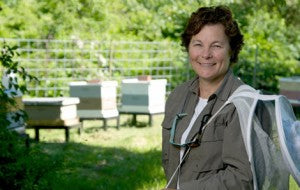Bees and Pesticides
The bees and pesticides argument rages on. I won't bore you with the minutiae of the current debate on neonicotinoids, but let's just say the quality of it leaves something to be desired. There's much bloody mindedness, politics, mudslinging and finger pointing going on. I'm pleased it has highlighted the decline in bee populations though, which seem to me to be the canary in the coal mine. A ban on neonicotinoids would of course be helpful, but I'm increasingly concerned that folk see this as an instant panacea. Once this single and high profile issue is sorted out - as I hope it will be - then will all be well again? I'm afraid it won't.
We're talking here mostly about honeybees and pesticides, as they're the only bee we know much about. They have a lot to cope with at the moment other than neonicotinoids. For a start there has been the weather here. I have lost a really nice swarm which I hived last summer. Heartbreaking. I did everything right, but they just gave up. Most of my competent beekeeping friends report significant mortality over the extended winter, following last year's filthy summer. These are experienced beekeepers who keep their bees really well; they're not over-interventionist or "commercial", nor do they just trust to luck. We've all dealt with the recent enemies of honeybees - nosema and varroa - but this is a new battle.
Yesterday I went to a fascinating talk by Maryanne Frazier, of Penn State University's Centre for Pollinator Research, on bees and pesticides. This reinforced the multiple challenges honeybees are facing. Like many honeybee scientists, Maryanne's best guess is that there is no single smoking gun behind bee declines in the U.S., but rather a complicated matrix of factors weakening honeybees' immune systems.
Bees and pesticides don't mix, and the cocktail of pesticides her team are finding in pollen and wax are horrific. They found 31 pesticides in one pollen sample. The average is 6, which is bad enough*. These pesticides can have sub-lethal effects, they can be systemic (like neonicotinoids) and they impact on larva and adult bees in different ways, so their effects are difficult to assess.
What's worse is that they can be synergistic, so that in combination their impact can be much more extreme than you can predict. Neonicotinoids are very toxic, but more traditional pesticides combine to have really unpleasant effects on colonies. This is true of fungicides and miticides too. Why do I mention miticides? The vast majority of wax in U.S. hives has traces of stuff called Fluvalinate, which was routinely used to wack varroa mites and combines unpleasantly with other pesticides. Fungicides too can be dangerous to bees as they impact microbial activity in the bee gut. Bees also suffer much more exposure to them, as they're used indiscriminately.
There's also an issue in the U.S. with the vast monocultures that migratory bee colonies are asked to pollinate. Honeybees are "polylectic" - that's to say that like Bumblebees they prefer different types of forage to provide a varied and healthy diet. Large scale U.S. commercial beekeeping must add to the strees that these honeybees experience.
So what does Maryanne recommend we do?
1. Manage our honeybees better. We can't just leave them to fend for themselves, but we can adopt better beekeeping practices. I'd like to think they're the sort of things I promote already. Change wax regularly, leave lots of stores so artificial feeding is only necessary in dire circumstances, and leave be throughout the autumn and winter months. It's not rocket science.
2. Provide diverse and season long sources of forage.
3. Improve our regulatory agencies. As in the U.K., U.S. regulators are only interested in the lethal effects of individual toxins on a small group of affected species, which is hopeless. Realistically, we're not going to be able to stop people using pesticides and honeybees, with their vast ranges, are going to be exposed to them. We have to make sure that the damage that does to them is as limited as possible.
It's worth pointing out that we can all help with points 2 and 3 by being bee friendly gardeners!
*I hasten to add that the honey itself has no problem. Most of these nasties are fat soluble rather than water soluble, so turn up in beeswax and not honey.

